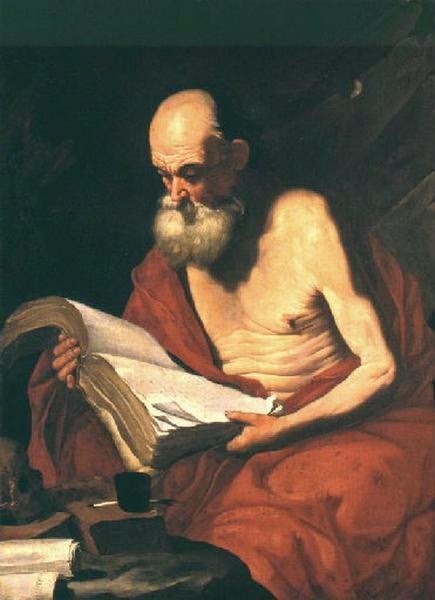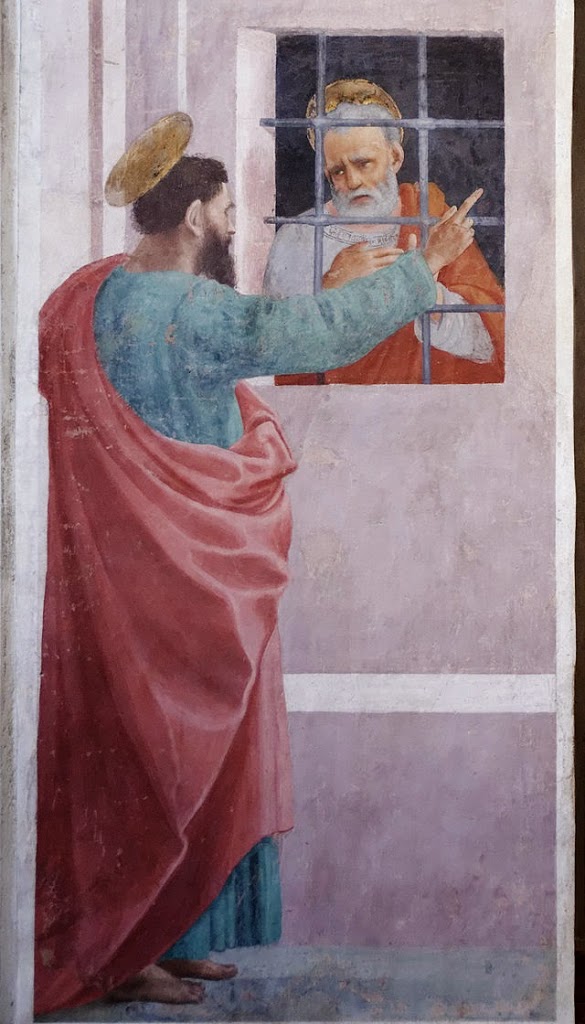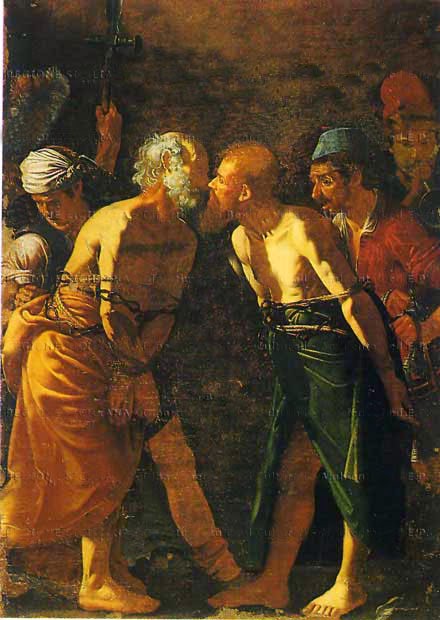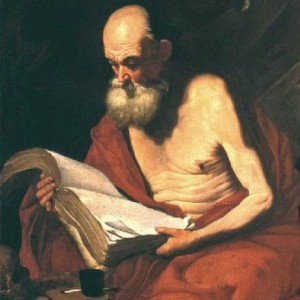 |
| Hendrick van Someren, Saint Jerome (17th c.) |
After St. Augustine, St. Jerome seems to be the favorite Church Father of many Protestants (most likely, because he argued for the Old Testament canon that they now use). We Catholics love him, too: he translated the Latin Vulgate, wrote beautifully on the Virgin Mary, and is one of the four original Doctors of the Church.
Given our shared love of Jerome, and his important contributions to our understanding of Sacred Scripture, it’s instructive to hear his challenge detailing how you can know that you’re a part of the true Church. Instead of following the latest group claiming to have the best (or most literal) interpretation of the Bible, Jerome calls us to follow the Church founded by the Apostles:
We ought to remain in that Church which was founded by the Apostles and continues to this day. If ever you hear of any that are called Christians taking their name not from the Lord Jesus Christ, but from some other, for instance, Marcionites, Valentinians, Men of the mountain or the plain, you may be sure that you have there not the Church of Christ, but the synagogue of Antichrist. For the fact that they took their rise after the foundation of the Church is proof that they are those whose coming the Apostle foretold. And let them not flatter themselves if they think they have Scripture authority for their assertions, since the devil himself quoted Scripture, and the essence of the Scriptures is not the letter, but the meaning. Otherwise, if we follow the letter, we too can concoct a new dogma and assert that such persons as wear shoes and have two coats must not be received into the Church.
St. Edmund Campion, in the seventh of the Ten Reasons against the Reformation, takes up this challenge, showing that the Church founded by the Apostles at Rome continues to this day, and that she never abandoned the faith for which she was already world-famous in the time of St. Paul (Romans 1:8-9).
This has clear implications for the validity of the Reformation. After all, any justification for the Reformation presupposes that the Church had fallen into apostasy, or at least heresy. And the evidence for this can’t just be, “the Catholic Church disagrees with me, and how I interpret Scripture!” That just as easily — indeed, much more easily — shows that you’re the one in the wrong. No, to show that the Church has fallen, you should be able to show when (and how, and over whose objections) she stopped following the true faith and started following a false one. That this burden can’t be met by those defending the Reformation speaks volumes.
 |
| Filippino Lippi, St. Paul Visiting St. Peter in Prison (1428) |
Campion begins the historical argument by considering the research done by three different groups of historians: early Christian historians, like Jerome; 16th century Protestant historians, who mined the historical record for justifications for the Reformation; and nationalist historians, recounting the history of their own country (including the history of Christianity in their own country). None of these three groups have come up with anything to suggest a change in religion: that there was a pre-Catholic form of Christianity that was then overthrown or reformed into Catholicism:
Ancient History unveils the primitive face of the Church. To this I appeal. Certainly, the more ancient historians, whom our adversaries also habitually, consult, are enumerated pretty well as follows: Eusebius, Damasus, Jerome, Rufinus, Orosius, Socrates, Sozomen, Theodoret Cassiodorus, Gregory of Tours, Usuard, Regino, Marianus, Sigebert, Zonaras, Cedrinus, Nicephorus. What have they to tell? The praises of our religion, its progress, vicissitudes, enemies. Nay, and this is a point I would have you observe diligently, they who in deadly hatred dissent from us,—Melancthon, Pantaleon, Funck, the Centuriators of Magdeburg,—on applying themselves to write either the chronology or the history of the Church, if they did not get together the exploits of our heroes, and heap up the accounts of the frauds and crimes of the enemies of our Church, would pass by fifteen hundred years with no story to tell.
Along with the above-mentioned consider the local historians, who have searched with laborious curiosity into the transactions of some one particular nation. These men, wishing by all means to enrich and adorn the Sparta which they had gotten for their own, and to that effect not passing over in silence even such things as banquets of unusual splendour, or sleeved tunics, or hilts of daggers, or gilt spurs, and other such minutiae having any smack of revelry about them, surely, if they had heard of any change in religion, or any falling off from the standard of early ages, would have related it, many of them; or, if not many, at least several; if not several, some one anyhow. Not one, well-disposed or ill-disposed towards us, has related anything of the sort, or even dropped the slightest hint of the same.
For example. Our adversaries grant us,—they cannot do otherwise,—that the Roman Church was at one time holy, Catholic, Apostolic, at the time when it deserved these eulogiums from St. Paul: Your faith is spoken of in the whole world. Without ceasing I make a commemoration of you. I know that when I come to you, I shall come in the abundance of the blessing of Christ. All the Churches of Christ salute you. Your obedience is published in every place (Rom. i. 8, 9; xv. 29; xvi. 17, 19): at the time when Paul, being kept there in free custody, was spreading the gospel (Acts xxviii. 31) : at the time when Peter once in that city was ruling the Church gathered at Babylon (1 Peter v. 13): at the time when that Clement, so singularly praised by the Apostle (Phil. iv. 3) was governing the Church: at the time when the pagan Caesars, Nero, Domitian, Trajan, Antoninus, were butchering the Roman Pontiffs: also at the time when, as even Calvin bears witness, Damasus, Siricius, Anastasius and Innocent guided the Apostolic bark. For at this epoch he generously allows that men, at Rome particularly, had so far not swerved from Gospel teaching.
 |
| Alonzo Rodriguez, Farewell of Saints Peter and Paul (16th c.) |
So, the Roman Church started off orthodox, and the eyes of the world were upon it: after all, it was the place that Peter and Paul were martyred, and was the capital of the world. Given this, when did the Roman Church cease to hold the Apostolic faith, and why did nobody seem to notice? How did it happen, exactly?
When then did Rome lose this faith so highly celebrated? when did she cease to be what she was before? at what time, under what Pontiff, by what way, by what compulsion, by what increments, did a foreign religion come to pervade city and world? What outcries, what disturbances, what lamentations did it provoke? Were all mankind all over the rest of the world lulled to sleep, while Rome, Rome I say, was forging new Sacraments, a new Sacrifice, new religious dogma? Has there been found no historian, neither Greek nor Latin, neither far nor near, to fling out in his chronicles even an obscure hint of so remarkable a proceeding?
Remember, it’s not like Rome was some backwater town, out of sight, that could quietly fall into apostasy. Nor were the early Christians afraid to take one another task, even for relatively trivial issues. This is a period in Church history in which Christians were obsessed with orthodoxy, giving up their lives instead of altering an iota of doctrine. And we have good records of the history of the Roman church. Indeed, the Church Fathers establish the orthodoxy of the entire Catholic Church by pointing to Apostolic Succession in Rome, with the successions of popes from Peter down to their own time. And we’re to believe that the preeminent church in all of Christianity silently fell into heresy without anyone making a peep?
Let’s recap the argument briefly:
- The early Roman Church was famous for its faithfulness. This much, all parties agree upon.
- Did the Church remain faithful? If it did remain faithful, then the Reformation is unjustified (and the Reformers are wrong for inventing new doctrines).
- If it didn’t remain faithful, did anyone warn these Christians as they turned from orthodoxy to heresy? If so, produce the evidence detailing this.
- If they didn’t decry this slide into heresy, why not? If they were orthodox Christians, how could they have remained silent? And if they had themselves become heretics, when did this happen (and why did no one warn them, etc.)?
This leads to three possible conclusions: the Roman church never fell from its Apostolic faith; it fell, amidst the cry of orthodox Christians everywhere; or the whole world simultaneously became heretical, without any outcry.The second option is without any evidentiary support (of which, we should expect to see quite a bit), and the third is both logically unbelievable and theologically impossible (since it would suggest that the Holy Spirit just suddenly and inexplicably abandoned the Church).
So that leaves us with the recognition that the Roman church was still holding to orthodox teachings at the time of the Reformation, meaning that all of the teachings that the Reformers introduced (and claimed to be restoring to the Church) were really manmade accretions:
Therefore this much is clear, that the articles of our belief are what History, manifold and various, History the messenger of antiquity, and life of memory, utters and repeats in abundance; while no narrative penned in human times records that the doctrines foisted in by our opponents ever had any footing in the Church.

Church History is an important witness not only for purposes of proving doctrinal orthodoxy and consistency, but also for revealing how the teachings of Christ were fulfilled by Christians throughout this same history. Even as Jesus fulfilled prophesies from Jewish history, so also Christian saints have fulfilled sayings and prophesies of Christ throughout our own Christian History. The moral example found in Christian biography, and history, transformed the ancient world. The Desert Fathers, in particular, by means of their asceticism and monasticism, influenced St. Benedict, St. Columba, and other western Saints to found monasteries throughout western Europe after the fall of the Roman Empire. This, in turn, helped keep both religious and secular education alive throughout Europe, and also kept the Holy Scriptures in print before the invention of the printing press. Without the Desert Fathers, and the benefits of Catholic monasticism, Europe and the entirety of Western civilization as we know it, would not exist. So this great Catholic History is something worth noting, but it seems that the Protestant reformers either completely neglect it, if not reject it, entirely.
As I said before. John Calvin despises the Early Fathers. James White and Matt Slick (both Calvinists) read their beliefs back into the Early Fathers.
“When then did Rome lose this faith so highly celebrated? when did she cease to be what she was before? at what time, under what Pontiff, by what way, by what compulsion, by what increments, did a foreign religion come to pervade city and world? What outcries, what disturbances, what lamentations did it provoke?
Martin Luther was very attached to many elements of Catholicism. He just wanted to adapt it towards his ends, according to his particular tastes. He was particularly attached to the Liturgy of the Mass, but again, remodeled for his purposes. Here is what he said about the Mass:
We on our part also retain many ceremonies and traditions (such as the liturgy of the Mass and various canticles, festivals, and the like) which serve to preserve order in the church. (Augsburg Confession XXVI:40 [German])
We are unjustly accused of having abolished the Mass. Without boasting, it is manifest that the Mass is observed among us with greater devotion and more earnestness than among our opponents. (Augsburg Confession XXIV:9 [German])
We are perfectly willing for the Mass to be understood as a daily sacrifice, provided this means the whole Mass, the ceremony and also the proclamation of the Gospel, faith, prayer, and thanksgiving. Taken together, these are the daily sacrifice of the New Testament; the ceremony was instituted because of them and ought not be separated from them. Therefore Paul says (I Cor. 11:26), “As often as you eat this bread and drink the cup, you proclaim the Lord’s death.” (Apology XXIV:35
…we do not abolish the Mass but religiously keep and defend it. In our churches Mass is celebrated every Sunday and on other festivals, when the sacrament is offered to those who wish for it after they have been examined and absolved. (Apology XXIV:1)
***************************************
I wonder how this squares with ‘Sola Scriptura’?
I wonder if the Americans removed significant parts of the US Constitution they could still say they they ‘loved’ the Constitution’ and hadn’t abolished it?
Hi!
I’m enjoying very much the discover of such apologetical work done by St. Campion!
On the present subject, i have one question: what if they (the protestants or, in this case, even the orthodox cristians) say the Church was corrupted in Middle Ages? In this case we have a group of “orthodox” accusing Rome of heresy. So what?
Joao,
If the person were to concede that the Church – and particularly the Church at Rome – was orthodox until the Middle Ages, they would have to concede the orthodoxy of the Catholic Church. All of the major contested doctrines can be easily found in the pre-Medieval Church.
I.X.,
Joe